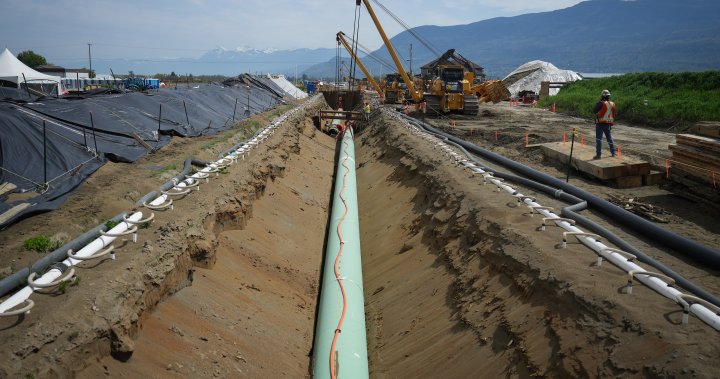A recently released report from the Trans Mountain pipeline company sheds light on the causes of the significant cost overruns in its expansion project. One major factor was an abandoned landfill site that posed an “extreme risk” to construction crews along the pipeline route.
The report, consisting of 47 pages, was submitted to the Canadian Energy Regulator. It reveals that the construction crews encountered a landfill that had not been previously identified. Although it is unclear if this is the same landfill mentioned earlier, Global News confirms that pipeline diggers did encounter buried car parts and other objects in a Coquitlam landfill.
Trans Mountain has declined to provide specific details about the location or the cost of fixing the problem. However, the report highlights that these landfill issues were just one example of the unforeseen challenges faced by contractor crews throughout the project.
The expansion project’s cost estimate has skyrocketed from $5.3 billion in 2017 to $30.9 billion this year. Trans Mountain attributes this increase to using incomplete information when developing the pipeline route and initial cost estimates. The report also highlights discrepancies between the information provided and the actual conditions at the work sites.
Unidentified landfills pose serious risks to pipeline construction crews, exposing them to toxic chemicals and potentially hazardous materials. Dealing with excavated waste can also lead to additional costs, particularly in the Lower Mainland area of British Columbia.
The report, which is the first comprehensive document addressing the cost overruns, highlights various reasons, including work stoppages, legal challenges, permitting delays, and rising construction resource costs, along with the expenses associated with accommodation and compensation deals with Indigenous groups, landowners, and affected communities.
Despite the challenges and mounting costs, the Trans Mountain pipeline expansion project aims to double its capacity and increase direct exports to Asia, reducing reliance on the U.S. oil pipeline network. The Canadian government sees it as an opportunity to generate new tax revenues, create jobs, and boost economic growth. However, critics argue that the high costs and environmental impact make it unsustainable.
The report briefly mentions the “previously unidentified landfill” along the pipeline route, offering limited details but emphasizing the need for mitigation measures. While experts find it surprising that construction crews encountered an uncharted landfill, Trans Mountain acknowledges that the initial plans and estimates were based on incomplete data.
Moving forward, Trans Mountain plans to increase the tolls it charges oil company customers to recoup some of the costs. However, oil companies argue against these proposed increases, questioning the reasonableness and necessity of the additional expenses.
Overall, the report sheds light on the challenges faced during the Trans Mountain pipeline expansion project and the need for improved data gathering and planning to avoid unforeseen issues.
Denial of responsibility! VigourTimes is an automatic aggregator of Global media. In each content, the hyperlink to the primary source is specified. All trademarks belong to their rightful owners, and all materials to their authors. For any complaint, please reach us at – [email protected]. We will take necessary action within 24 hours.


